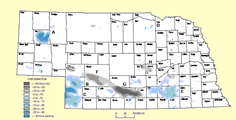Natural Resources, School of

Conservation and Survey Division: Faculty and Staff Publications
Document Type
Article
Date of this Version
1-1-2017
Citation
Burbach, M.E, Reiners-Hild, C., 2017 2016 Nebraska Water Leaders Academy - Final Report (OFR-151) University of Nebraska. 52 pp.
Abstract
The effective management of Nebraska’s water resources is evermore challenged by variations in weather, climate, technology, socioeconomic policies, and regulation. Anthropogenic climate change, declining water tables and stream flows, increasing demands on freshwater, aging water infrastructure, fiscal constraints, and impacts on aquatic organisms are particularly imminent challenges in Nebraska and around the world (Pahl-Wostl et al., 2013; Pittock et al., 2008; USACE, 2010). Sustaining freshwater ecosystem services in the face of emerging environmental threats presents an immense societal dilemma worldwide (Pittock et al., 2013; Rockström et al., 2009, Millenium Ecosystem Assessment, 2005). The rapidly changing conditions of water resources in Nebraska demands knowledgeable and skilled leaders (Burbach, et al., 2015; Lincklaen Arriëns & When de Montalvo, 2013; Morton & Brown, 2011). McIntosh and Taylor (2013) assert that in order to meet future water challenges, “leadership is needed to initiate and drive change, enable innovation (both incremental and radical), build shared visions for a more sustainable water future, and deliver these visions through aligning resources and building commitment to collective success” (p. 46). Building leadership capacity is required to drive the necessary change (Brasier et al., 2011; Morton et al., 2011; Pahl-Wostl et al., 2011; Redekop, 2010; Taylor et al., 2012). Recognizing this critical need for future leaders in water resources, the Nebraska State Irrigation Association
Included in
Geology Commons, Geomorphology Commons, Hydrology Commons, Paleontology Commons, Sedimentology Commons, Soil Science Commons, Stratigraphy Commons


Comments
OFR-151